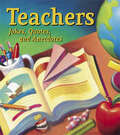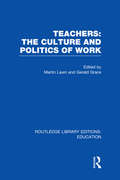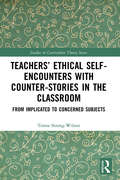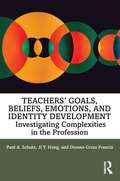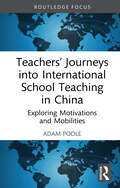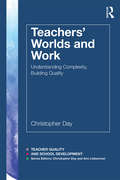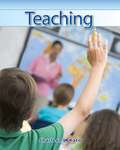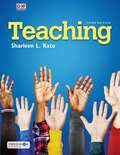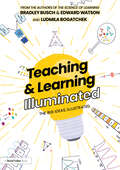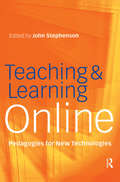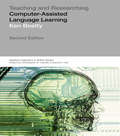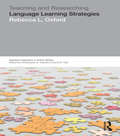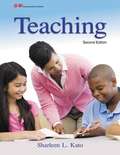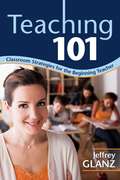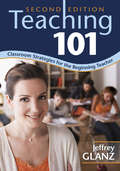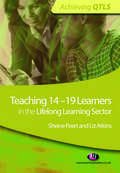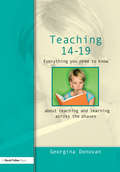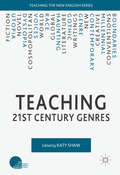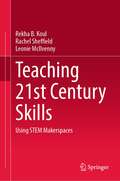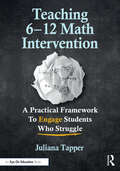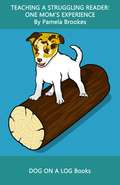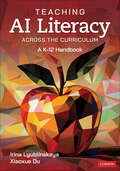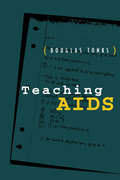- Table View
- List View
Teachers: Jokes, Quotes, and Anecdotes
by Andrews McMeel PublishingCelebrate America&’s teachers with this delightful compendium of wit and wisdom on the subject of education. With more than 150 jokes, quotes, and anecdotes, this little volume honors the vital role teachers play in our lives. Entries from great minds across the ages—ranging from Aristotle to Mark Twain and beyond—remind us that educators not only help shape who we are, but society as a whole. After all, as Rudyard Kipling once said, &“he who can reach a child&’s heart can reach the world&’s heart.&”
Teachers: Jokes, Quotes, and Anecdotes
by Andrews McMeel PublishingCelebrate America&’s teachers with this delightful compendium of wit and wisdom on the subject of education. With more than 150 jokes, quotes, and anecdotes, this little volume honors the vital role teachers play in our lives. Entries from great minds across the ages—ranging from Aristotle to Mark Twain and beyond—remind us that educators not only help shape who we are, but society as a whole. After all, as Rudyard Kipling once said, &“he who can reach a child&’s heart can reach the world&’s heart.&”
Teachers: The Culture and Politics of Work (Routledge Library Editions: Education)
by Martin Lawn Gerald GraceThis book examines the experience and politics of teachers’ work, questions of teacher appraisal, and the struggles of the teachers’ action of 1984-86. A major section of the book charts the changing power relations between organized teachers and the State in Britain from 1900 to the late 1980s. The contributors to this volume write from a variety of perspectives, including conflict theory, socio-historical analysis, feminist analysis, diary-based ethnography, and interview-based research. With its sensitivity to this range of perspectives and its bringing together of the experimental aspects of teaching, as well as its class, gender and political relations, this book is an authoritative source for courses in education, sociology, history and social policy.
Teachers’ Ethical Self-Encounters with Counter-Stories in the Classroom: From Implicated to Concerned Subjects (Studies in Curriculum Theory Series)
by Teresa Strong-WilsonOffering unique theoretical perspectives, autobiographical insights and narrative accounts from elementary and secondary educators, this monograph illustrates the need for teachers to engage critically with counter-stories as they teach to issues including colonization, war, and genocide. Juxtaposing Pinar’s concept of ethical self-encounters with theories of subjective reconstruction, multidirectional memory, and autobiographical narration, this rich volume considers teachers’ ethical responsibility to interrogate the curriculum via self-reflection and self-formation. Using cases from workshops and classrooms conducted over five years, Strong-Wilson traces teachers’ and students’ movement from "implicated subjects" to "concerned subjects." In doing so, she challenges the neoliberal dynamics which erode teacher agency. By working at the intersections of pedagogy, literary theory and memory studies, this book introduces timely arguments on subjectivity and ethical responsibility to the field of education in the Global North. It will prove to be an essential resource for post-graduate researchers, scholars and academics working with curriculum theory and pedagogical theory in contemporary education.
Teachers’ Goals, Beliefs, Emotions, and Identity Development: Investigating Complexities in the Profession
by Paul A. Schutz Ji Hong Dionne Cross FrancisTeachers’ Goals, Beliefs, Emotions, and Identity Development discusses the nonlinear, multifaceted processes of teacher development by foregrounding constructs related to well-being and professional standards. Teachers lead full, complex lives that are set in both immediate and social-historical realities that significantly shape their ongoing successes and challenges. Informed by a range of psychological and educational theories and perspectives and meaningfully situated in contemporary perspectives of teacher well-being, this book offers comprehensive and holistic approaches to the processes and contexts of teacher development. The authors’ research and implications for practice will be useful for prospective and practising teachers, teacher educators, classroom researchers, school administrators, and policymakers.
Teachers’ Journeys into International School Teaching in China: Exploring Motivations and Mobilities (Routledge Series on Schools and Schooling in Asia)
by Adam PoolePoole’s book illuminates the experiences and perspectives of host country national teachers at internationalised schools in China. The international school sector in China has undergone significant changes in recent years. This is due to the growing demand for international education from local middle-class families. In response, a new type of school has emerged. Going by various names, such as private, bilingual or internationalised, these schools offer a fusion of national and international curricula and are staffed predominantly by host country national teachers. Despite these changes, we still know little about who host country national teachers are and what draws them to the world of international schooling. Accordingly, this book explores the motivations and mobilities of host country national teachers in China. It identifies three types of teacher: Returners, Reachers, and Remainers. Returners are graduates who have returned to China from overseas study. They are drawn to international schools by the opportunity to use their international experience and qualification. Reachers are internal migrants who face structural inequality and attracted to international schools by the opportunity for social mobility. Remainers are married teachers with children. They are motivated to work in international schools by the perceived stability and security these schools offer. Discussing implications for teacher recruitment, development, and retention in international schools, this book is an essential read for international educational researchers as well as students researching international education or teacher identity.
Teachers’ Worlds and Work: Understanding Complexity, Building Quality
by Christopher DayUnderstanding what influences the quality of teachers’ work across a career is key to building and sustaining their on-going commitment and effectiveness. Teachers’ Worlds and Work provides a new, research-informed consideration of key elements which independently and together influence teachers' work and lives: policy and workplace conditions, teacher professionalism, identity, emotions, commitment and resilience, types of professional learning and development, and the importance of the contribution to these made by high-quality leadership. In bringing these elements together, the book provides new, detailed and holistic understandings of their influence and suggests ways of building and sustaining teachers' abilities and willingness to teach to their best and well over their careers. This groundbreaking text will be essential reading for teacher educators, teachers, head teachers and academics.
Teaching
by Sharleen L. KatoTeaching, a great text for students considering a career in the field of education, helps the teachers of tomorrow explore the world of education and discover what makes a teacher effective. Students will learn about the history of education in the United States and how schools impact society. They will learn about all types of learners—how they change physically, intellectually, emotionally, and socially—and how that impacts the way they are taught. Additionally they will learn how to design an instructional plan, choose teaching strategies, and create an effective learning environment for their future students. Teaching includes four units: • Unit 1, You: The Teacher of Tomorrow, focuses on what a teacher does, the qualities of an effective teacher, and steps to becoming a teacher. • Unit 2, The Learner, explores human development, developmental theories, and the various developmental stages of children through teens. • Unit 3, The School, describes the early history of education in America, modern history of education, and current aspects of schools, including federal, state, and local responsibilities. • Unit 4, The Teacher, covers learning diversity, what makes an effective teacher, lesson planning, instructional strategies, technology, assessment, classroom management, and the student’s future as a teacher.
Teaching & Learning Illuminated: The Big Ideas, Illustrated
by Edward Watson Bradley Busch Ludmila BogatchekThis exciting new book from the bestselling authors of The Science of Learning takes complex ideas around teaching and learning and makes them easy to understand and apply through beautifully illustrated graphics. Each concept is covered over a double-page spread, with a full-page graphic on one page and supportive text on the other. This unique combination of accessible images and clear explanations helps teachers navigate the key principles and understand how to best implement them in the classroom. Distilling key findings and ideas for great evidence-based teaching from a broad range of contemporary studies, the book covers the research findings, ideas and applications from the most important and fundamental areas of teaching and learning including: Retrieval Practice Spacing Interleaving Cognitive Load Theory Rosenshine’s Principles Feedback Resilience Metacognition Written to support, inspire and inform teaching staff and those involved in leadership and CPD, Teaching & Learning Illuminated will transform readers' understanding of teaching and learning research.
Teaching & Learning Online: New Pedagogies for New Technologies (Creating Success Ser.)
by John StephensonA guide to teaching and learning online. It presents a wide range of experience and research findings from leading practitioners and organizations around the world, including case studies from the Open University, the BBC, ICL and leading international academics.
Teaching & Researching: Computer-Assisted Language Learning (Applied Linguistics in Action)
by Ken BeattyComputers play a crucial and rapidly evolving role in education, particularly in the area of language learning. Far from being a tool mimicking a textbook or teacher, Computer-Assisted Language Learning (CALL) has the power to transform language learning through the pioneering application of innovative research and practices. Technological innovation creates opportunities to revisit old ideas, conduct new research and challenge established beliefs, meaning that the field is constantly undergoing change. This fully revised second edition brings teachers and researchers up-to-date by offering:A comprehensive overview of CALL and current research issuesStep-by-step instructions on conducting research projects in CALL Extensive resources in the form of contacts, websites and free software references A glossary of terms related to CALLClosely linked to other branches of study such as autonomy in language learning and computer science, CALL is at the cutting edge of current research directions. This book is essential reading for all teachers and researchers interested in using CALL to make language learning a richer, more productive and more enjoyable task. Ken Beatty has taught at colleges and universities in Canada, Asia and the Middle East. His publications include more than 100 textbooks for learning English as a Second Language, as well as various websites, CD-ROMs and educational videos.
Teaching & Researching: Self-regulation In Context, Second Edition (Applied Linguistics in Action)
by Rebecca L. OxfordOver the past thirty years, the field of language learning strategies has generated a massive amount of interest and research in applied linguistics. Teaching and Researching Language Learning Strategies redraws the landscape of language learning strategies at just the right time. In this book Rebecca Oxford charts the field systematically and coherently for the benefit of language learning practitioners, students, and researchers. Offering practical, innovative suggestions for assessing, teaching, and researching language learning strategies, she provides examples of strategies and tactics from all levels, from beginners to distinguished-level learners, as well as a new taxonomy of strategies for language learning. In demonstrating why self-regulated learning strategies are necessary for language proficiency, Oxford integrates socio-cultural, cognitive, and affective dimensions, and argues convincingly for the need for conceptual cross-fertilization. Providing clear and concise explanations of the advantages and limitations of the different approaches, this book is full of practical value and theoretical insights. The book is designed to guide the reader with the use of a range of features, including: key quotes and concept boxes preview questions and chapter overviews glossary and end-of-chapter further readings sources and resources section
Teaching (2nd Edition)
by Sharleen L. KatoTeaching helps students, the teachers of tomorrow, explore the world of education. Besides investigating teaching as a profession, students will develop an understanding of the different types of learners they will encounter in the classroom. This includes how humans develop physically, intellectually, emotionally, and socially as all of these impact the instructional methods used. The educational system, both past and present, is reviewed along with the responsibilities that come with employment. Students receive a full introduction to the role and duties of a teacher, including planning, instructional methods, assessment, and classroom management. Expanded chapter reviews help students develop a variety of skills while new professionalism features emphasize appropriate workplace behavior. This is the only textbook available for high school students planning a teaching career.
Teaching 101: Classroom Strategies for the Beginning Teacher
by Jeffrey GlanzThe noble profession of teaching plays a vital role in inspiring students to achieve excellence. This new edition of one of the most comprehensive introductions to teaching available provides essential knowledge and actively engages new teachers in practice to become an exceptional teacher. Easy to understand and practical, this wide-ranging guide provides tools such as questions and activities at the end of each chapter, Web sites and vital readings for further study, and a self-assessment instrument to help readers succeed in their first year. The second edition includes more information on curriculum development and technology, more sample lesson plans, a new section on bullying, new activity sheets, and many checklists with immediate application procedures. The book is packed with helpful suggestions on topics such as: Lesson planning Classroom management Differentiating instruction Standards Assessment and grading Literacy Cooperative learning Inclusion National Board certification Teaching 101 is an invaluable resource that teachers can reference throughout their careers to expand their skills and perspectives.
Teaching 101: Classroom Strategies for the Beginning Teacher
by Jeffrey Glanz"One of the richest books I have ever read for beginning teachers. Even veteran teachers will get a lot out of it. I really wish I had a book like this when I was a student teacher."—Julie Wakefield, Social Studies TeacherRobert McQueen High School, Sparks, NVReflect on the art of teaching to develop your skills and expand your horizons!The noble profession of teaching plays a vital role in inspiring students to achieve excellence. This new edition of one of the most comprehensive introductions to teaching available provides essential knowledge and actively engages new teachers in practice to become an exceptional teacher.Easy to understand and practical, this wide-ranging guide provides tools such as questions and activities at the end of each chapter, Web sites and vital readings for further study, and a self-assessment instrument to help readers succeed in their first year. The second edition includes more information on curriculum development and technology, more sample lesson plans, a new section on bullying, new activity sheets, and many checklists with immediate application procedures. The book is packed with helpful suggestions on topics such as:Lesson planningClassroom managementDifferentiating instructionStandardsAssessment and gradingLiteracyCooperative learningInclusionNational Board certificationTeaching 101 is an invaluable resource that teachers can reference throughout their careers to expand their skills and perspectives.
Teaching 14-19 Learners in the Lifelong Learning Sector (Achieving QTLS Series)
by Sheine Peart Liz AtkinsMore and more, teachers in the lifelong learning sector are required to teach the 14-19 age group. This book is a practical guide to delivering learning to 14-19s. It begins by looking at the background to teaching 14-19 in FE and covers current pathways for achievement. Coverage of effective delivery of the new Diploma qualification is included, giving guidance on planning and assessment. It goes on to explore the challenges of behaviour, participation and re-engaging disaffected learners. Finally, it considers the wider context of building partnerships with schools and the needs of industry and employers.
Teaching 14-19: Everything you need to know....about learning and teaching across the phases
by Georgina DonovanThe emergence of the new 14-19 sector raises huge learning and teaching issues for both schools and colleges of further education. A new generation of skilled and flexible professionals will need to be trained and re-trained. Teachers in both sectors are understandably nervous about the impending changes. Covering everything a teacher needs to know about learning and teaching across these phases, this book: supports recent government policy initiatives for the 14-19 sector covers how to teach the 14-19 age phase in both schools and colleges addresses issues of concern for both teachers and college lectures helps both groups appreciate the background and rationale of the other sector. With a FAQ format, lots of practical advice and illustrative case studies, this book will be vital for all practitioners, experienced and trainee, in both secondary and post-compulsory education.
Teaching 21st Century Genres
by Katy ShawThis book is the first ever collection about twenty-first century genre fiction. It offers accessible yet rigorous critical interventions in a growing field of popular culture and academic study, presenting new genres as a fascinating and powerful means of reading contemporary culture. The collection explores the history and uses of genre to date, analyses key examples of innovations and developments in the field and reflects on how these texts have been mobilised in teaching since the year 2000. It explores a range of new twenty-first century genres through a close reading of key examples, along with a broader critical overview at the beginning of each chapter capturing wider developments, contexts and themes. As a result of this contextual, text-orientated approach, the book promotes a broad appeal beyond the specifics of new genres and authors, and will contribute to a wider understanding of developments in post-millennial fictions.
Teaching 21st Century Skills: Using STEM Makerspaces
by Rachel Sheffield Rekha B. Koul Leonie McIlvennyThis book helps educators provide opportunities for their students to engage in creative and collaborative projects that blur the lines between subjects and promote problem-finding and problem-solving activities. It offers a global perspective on makerspaces through an Indian and Australian lens, illustrating the commonalities between the approach and the pedagogy in order to highlight the universal nature of these essential 21st-century skills. The book is particularly useful for science, technology and mathematics teachers, highlighting the potential of engaging in a more integrated curriculum approach to their specific discipline. It is of great interest to scholars whose research focuses on understanding 21st-century skills and how they can be taught and assessed in a school setting. It is an indispensable resource for teacher educators, school administrators, curriculum designers, policymakers and researchers in the field of science education.
Teaching 6-12 Math Intervention: A Practical Framework To Engage Students Who Struggle
by Juliana TapperThis practical resource offers a classroom-tested framework for secondary math teachers to support students who struggle. Teachers will explore an often-overlooked piece of the math achievement puzzle: the gatekeeping cycles of mathematics and the importance of teachers' own expectations of students. The immediately applicable strategies in this book, developed through the author’s work as a math intervention teacher, intervention specialist, and instructional coach, will give teachers the tools to help students overcome math anxiety, retention struggles, and even apathy. Beginning with a deep dive into the gatekeeping cycles to help teachers better understand their students who struggle, the book then walks teachers through the five-part B.R.E.A.K. it™ Math Intervention Framework: Build Community, Routines to Boost Confidence, Engage Every Student, Advance Your Expectations, Know Students’ Level of Understanding. Educational research, personal anecdotes from the author’s own classroom, and examples from case study teachers are woven into each chapter, leading to clear action items, planning strategies, and best practices that are accessible enough to accommodate all grade levels and schedules. The framework and activities in this book enable teachers to help students overcome math anxiety, create a safe math environment for 6–12 students, and ultimately increase achievement with effective research-based suggestions for working with students who struggle.Find additional resources at www.gatebreakerbook.com.
Teaching A Struggling Reader: One Mom's Experience (DOG ON A LOG Books #1)
by Pamela BrookesThere are a lot of children (and adults) who struggle with reading. Some are helped by their schools, some are not. <P><P>In this short booklet, Pamela Brookes shares some of the basic information she wishes she’d had when she was first trying to figure out how to help her child learn to read. <P><P>Teaching A Struggling Reader is filled with links to informational and product resources for parents or teachers. It is geared to people who want to educate themselves in the methods that are effective in teaching those with a dyslexic learning style. It also contains photos demonstrating basic techniques like “Tapping” (using one’s fingers to aid in sounding out words) and “Making your bed” to differentiate between “b” and “d.” <P><P>The focus of this book is the reading process. However, since many dyslexic readers also struggle with math, there is a brief description of how the dyslexic brain comes to understand math. There is also a link to a blog by Dr. Meg Burke of Dyslexia Pros. She is a dyslexic learner with a PhD in math education who is dedicated to helping her students attain fluency in math. <P><P>This is a booklet that can be read in one sitting. However, there are ample links to provide an even greater experience.
Teaching AI Literacy Across the Curriculum: A K-12 Handbook
by Irina Lyublinskaya Xiaoxue DuAI is reshaping the future of education. Are your students ready? In an era where artificial intelligence (AI) is revolutionizing every facet of life, from how we shop to how we get our news, it’s inevitable that AI is changing the way we teach and the way students learn. For students to thrive in this world, they need more than just the ability to use technology; they need to understand how it works, its potential, and its limitations. They need AI literacy. Teaching AI Literacy Across the Curriculum delves into the symbiotic relationship between AI and education, providing cutting-edge research and practical strategies to seamlessly incorporate AI literacy into teaching across disciplines. Authors Irina Lyublinskaya and Xiaoxue Du introduce a pedagogical framework for teaching AI literacy that explores the Big Five Ideas in AI and integrates with practical strategies for teaching AI core concepts across different subjects. Divided into three parts, focusing on theoretical foundations, practical examples, and assessment of AI literacy, this book Offers guidance on integrating AI literacy across various subjects, such as Science, Mathematics, English Language Arts, and Social Studies Provides real-world examples that provoke thoughtful discussions on the ethical considerations and biases inherent in AI Helps teachers to foster critical thinking to ensure that students are well-prepared for the AI-driven future Includes a companion website with access to a wealth of resources such as lesson plans and supplemental materials, templates, and graphic organizers to support AI education in the classroom By weaving AI concepts into the educational tapestry, this book serves as a valuable resource for educators, offering practical strategies and insights to cultivate a generation of learners who are not only technologically adept but also critically engaged with the ethical and societal implications of AI.
Teaching AI Literacy Across the Curriculum: A K-12 Handbook
by Irina Lyublinskaya Xiaoxue DuAI is reshaping the future of education. Are your students ready? In an era where artificial intelligence (AI) is revolutionizing every facet of life, from how we shop to how we get our news, it’s inevitable that AI is changing the way we teach and the way students learn. For students to thrive in this world, they need more than just the ability to use technology; they need to understand how it works, its potential, and its limitations. They need AI literacy. Teaching AI Literacy Across the Curriculum delves into the symbiotic relationship between AI and education, providing cutting-edge research and practical strategies to seamlessly incorporate AI literacy into teaching across disciplines. Authors Irina Lyublinskaya and Xiaoxue Du introduce a pedagogical framework for teaching AI literacy that explores the Big Five Ideas in AI and integrates with practical strategies for teaching AI core concepts across different subjects. Divided into three parts, focusing on theoretical foundations, practical examples, and assessment of AI literacy, this book Offers guidance on integrating AI literacy across various subjects, such as Science, Mathematics, English Language Arts, and Social Studies Provides real-world examples that provoke thoughtful discussions on the ethical considerations and biases inherent in AI Helps teachers to foster critical thinking to ensure that students are well-prepared for the AI-driven future Includes a companion website with access to a wealth of resources such as lesson plans and supplemental materials, templates, and graphic organizers to support AI education in the classroom By weaving AI concepts into the educational tapestry, this book serves as a valuable resource for educators, offering practical strategies and insights to cultivate a generation of learners who are not only technologically adept but also critically engaged with the ethical and societal implications of AI.
Teaching AIDS
by Douglas TonksTeaching AIDS begins with a discussion of how teachers can create an environment of support for an AIDS education programme. Recognizing that AIDS education must differ for students of different age groups, the author presents tailored, age-appropriate content - what and how teachers should communicate AIDS information to young children, older children and teenage students.Teaching AIDS also addresses actual methods teachers can use to influence their students' attitudes and behaviour by helping them to recognize problem situations in which risks might arise, and presenting them with the actual skills they need to protect themselves in such situations.
